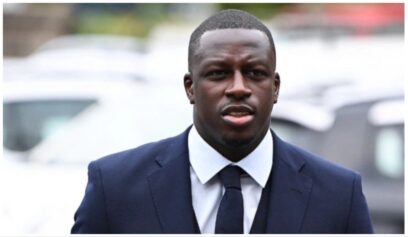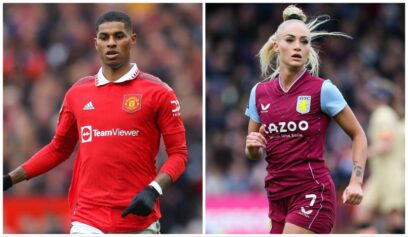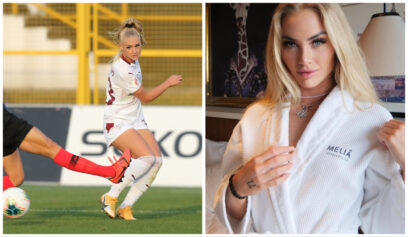Bilal Duckett hung up his soccer cleats and reflects on the “what’s next” anxiety pro athletes face.
The following story was written by Notre Dame grad and former professional soccer player, Bilal Duckett.
The phone rang, it was Aaron Maund, my best friend from college. ‘Hey man, I think I’m coming to Charlotte – looks like we’re going to be teammates again.’
This news, at any other point in my life, would have made my day – but this time, it absolutely killed me. Just killed my mood – because playing with Aaron again would have been another highlight of my career.
But I knew in my heart that a reunion with Aaron wasn’t going to happen because my heart had already told me that it was time to retire from soccer.
No doubt about it.
I’m sitting there with my girlfriend, watching TV, and just threw my phone down. Didn’t even want to look at it. Playing with Aaron, my “recruit” at the University of Notre Dame, where we were teammates for three years, would have been cool. As a senior in high school looking to come to Notre Dame, he was supposed to be chaperoned by one of the older guys on the team. But they passed him off to me, a freshman, and I kind of sat there with my hands in my pockets with no plan for the kid.
So, I’m showing him around campus – it’s maybe a Tuesday, and there’s nothing going on: no parties, nothing fun to do.
I think I took him to the student center and we sat out and just talked and people-watched for, like, six hours. He ended up committing to Notre Dame shortly thereafter and ends up becoming one of my closest friends to this day.
Aaron would spend his MLS career in Toronto. He was selected 12th overall by Toronto FC in the first round of the 2012 MLS SuperDraft before playing for Real Salt Lake for a few years and then with Vancouver, where I played in 2011.
Now, it looked like we’d be reunited again. It seemed too good to be true.
Retirement brings uncertainty, anxiety
I had been four interviews deep with a couple of different companies while I continued to rehab my surgically repaired shoulder. How much anxiety did I have about retiring? Too much and not enough at the same time. I believe my path as a player had led me to do things away from the game that prepared me to retire. And because of that, I’ve been able to, at least I think, retire gracefully. I have a good job, good opportunities and another career that I can step into that will set me up to do things further down the line.
I remember very distinctly, during my rookie season, playing with a guy who grew up in France and played at one of the top academies there. His teammates in the academy system were playing at places like Manchester City, Chelsea, and other top clubs in Europe. He was actually the first player in that group to leave the academy, and he left for big money and played in Russia. At this point, he was 26 or 27 years old, and you could see that he knew his career was ending.
And he was terrified.
He shared his anxiety with me and said, ‘Look, one of the things that I am most envious about you is that you have your college degree, and you have opportunities to do things that I may never have opportunities to do.’
He was right. Beyond getting my degree, I started a business and built up other skills and developed other relationships outside of soccer. I take great pride in the fact that I worked on a non-profit called ReThink, which aims to prevent sexual assault by working with young men and boys to break down the cultural norms that underpin sexual violence.

So I have been able to own my story as more than just an athlete, more than just a soccer player, and I think that those things helped mitigate my anxiety or fear after taking this step.
But that’s my brain talking.
In my heart, walking away is very difficult; very, very difficult. I’ve been playing this game for 25 years; every day, never taking more than a week or so off, and that’s a really big lifestyle change. I’m still processing those emotions. Thankfully, I’ve played long enough to where I have a good group of friends who have stepped away from the game that I can lean on during the transition. But I also have a lot of friends who are still playing the game, and I feel like I’m missing something – starting with the locker room. I’m stepping into a corporate world where I have no expectations of being able to be quite as free, and honest, as I was in the locker room.
Stepping Out on Faith, not Fear
Now I’m about to step in to a different kind of locker room.
Fear might not be the right word because I’ve been in enough locker rooms to know that I can adapt. I think anxiety is a better word, where you start thinking about what it’s actually going to be like to work at a job for 9, 10, 12 hours a day, wondering if I’m going to find the same kind of love in that job that I have had playing soccer.
That’s a little bit of an unknown.
But my professional career is ending almost like it began. When I played my last game at Notre Dame in November of 2010, I thought my playing career was over. I had a job offer that I hadn’t quite accepted from a consulting firm in Chicago, and I thought that’s what my path would be. Then, in a matter of weeks, I found out that my name was on the MLS Combine list, which led to an opportunity in Vancouver.

After being drafted first in the third round in the 2011 MLS SuperDraft by the Whitecaps, the decision to chase the dream was real. And, I did that for eight years – going from a cold, wet night in South Bend, Indiana, to lots of cold wet days in Vancouver. I’d end up playing in MLS for two years – for Vancouver and New England – before starting my career in the United Soccer League (USL) in my third year.
Coming out of school, I kind of laughed at the thought of playing in the USL. But after spending the majority of my career in the USL, I have seen first-hand where the standards, from players to ownership, have steadily been on the rise. To be fair, the league has exploded. We’ve got a ton of new ownership groups, investors and fan bases that are really invested in what the clubs are doing from a grassroots level. While most of the teams still can’t compete financially with MLS clubs, the level of play has been increasing at a rate on par with, or better than, the MLS’s rise. Will it ever catch up? Probably not, but that’s not what it’s meant to do.
I’ve heard the term “farm system” used to describe the USL. That’s not quite the case. It’s similar in some way to that of some Championship clubs in England, with players going there, growing and proving themselves to move on to MLS.
If I were to compare both leagues, the biggest difference in both leagues would be on the tactical side. In MLS, you’ve got two to four guys on a given roster who are true difference makers. Those players are making big money – guys like Wayne Rooney, Josef Martinez and Zlatan Ibrahimović. You’re not going to see players of that caliber in the USL, but most of the guys have either been in the MLS or will be.
I will say this — both leagues are good for the future of soccer in America. One of the things that I think that we forget, from an American standpoint, is that we’re trying to compete with leagues around the world that are sometimes hundreds of years old and have rabid fan bases. They have way more history and way more investment in their clubs, and that’s what we aspire to, what we hope for.

As a country – definitely with soccer – we’re spoiled because we’ve done everything so fast. We expect greatness from Day One. That’s not how it works with this sport, and we have to be patient.
Now that I’m retired, I fully expect that it might be hard to sit in the stands and watch a game. Emotions are different. You feel the energy. I may be a little apprehensive but I also understand that even that is a process.
If I could go back and talk to my 17-year-old self, I’d tell him to pay attention to the details. Find the right mentors, who aren’t always going to be your coaches. The other stuff comes and goes, sometimes quickly. You’ll have nights out. You’ll have all the glamour and stuff that people associate with pro athletes. But that’s not the majority of your time. Just make sure you latch on to somebody who is invested in your career as much as you can be invested in theirs.

My childhood wall had a poster of Thierry Henry on it, and I eventually got to play against him. That was my “Jordan” moment. I got to play against Manchester City my rookie season, in front of a sell-out crowd in Vancouver. That was spectacular. I got to play against Swansea City in Charlotte, in front of a sell-out crowd – also a spectacular moment for me. We came back from three goals down in overtime, in an Open Cup match against the New England Revolution in Harrisburg, and we battled back to win on penalties. We then went on to beat the New York Red Bulls a couple weeks later.
These were spectacular moments I’ll never forget.
I’ve experienced a lot and I have zero regrets … maybe one ‘what if,’ if I’m honest. Reuniting with Aaron might’ve been cool.
It’s funny the way things work out. He essentially took my position, but all of my experiences have brought me to exactly where I am today, which is fully prepared for the next chapter.
After an eight-year playing career – which started in 2011 in Major League Soccer and ended after a four-year run with the Charlotte Independence of the United Soccer League – Bilal Duckett, 30, decided to hang up his soccer cleats. The Notre Dame graduate, who has had his own web development company since 2013, starts a new chapter as an engineer at Deloitte Digital in Washington, D.C. The transition is going well, though he misses his 3 pm naps.



